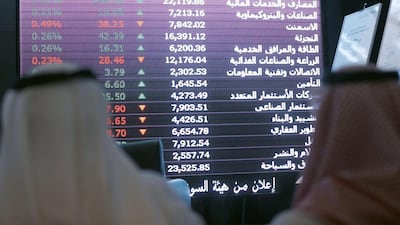Saudi Arabian stocks rallied yesterday amid signs that that the world’s biggest oil exporter would allow foreigners to own stakes in its listed companies by April next year. The drop in oil prices, however, may deter investment in the last major emerging market that is closed to foreigners, fund managers said.
The country’s benchmark stock index continued its second day of gains after the government said on Thursday that it planned to spend as much money next year as it did this year – even after the price of oil dropped almost by half in 2014. With a market capitalisation of more than US$500 billion, Saudi Arabia’s stock market makes is the biggest in the region.
The kingdom’s benchmark stock index closed 1.2 per cent higher. Al Rajhi Bank, the biggest lender by market value in the kingdom, and the mining company Maaden led the advance, adding 1.7 per cent and 7.5 per cent, respectively.
Saudi Arabia is seeking to open its stock exchange to foreign investors in April, Bloomberg News reported, citing three people briefed on the country's plans. The country had said in July that it would open up its stock market in the first half of 2015 to international investors.
The Capital Market Authority informed brokers and fund managers of the timeline in London last month, two of the people said, asking not to be identified as the meeting was private. No one was immediately available to comment at the CMA.
“I still think there will be foreign interest despite the oil price drop, but it will be selective,” said Sachin Mohindra, a portfolio manager at Invest AD, an Abu Dhabi-based asset manager. “Saudi Arabia is one of the last major emerging markets closed to foreign investors that is opening up, but compared to six months ago the interest would be selective.
“Earlier when they were talking about opening up and a lot of people got excited, a lot of people were taking a macroeconomic bet, that this is one of the region’s largest markets and therefore I need to be there,” he added. “There may be some pull back from the macro call given the pull back in oil and the volatility in oil that we may see in the next few months.”
Last week, Saudi Arabia kept to its pledge to maintain spending next year. After the plunge in oil prices, Saudi Arabia said that its revenue was projected to fall to 715 billion riyals (Dh699.36bn) next year, from 1.046 trillion riyals this year. Riyadh projects next year’s expenditure to be at 860bn riyals.
About 85 per cent of Saudi Arabian exports and 90 per cent of government revenue are directly derived from the hydrocarbons sector, according to the credit rating agency Standard & Poor’s.
“Despite the global environment of lower oil prices, the kingdom maintains its counter-cyclical economic policy in the 2015 fiscal budget,” said Jadwa Investment, a Riyadh-based asset manager. “It continues to highlight the government’s intention to stimulate the economy. We estimate that the allocation to investment spending remains elevated at 278 billion riyals, which will support healthy economic growth and provide encouragement and opportunities for the private sector at a time of global and regional uncertainty.”
Elsewhere, Dubai’s main stock measure rose 2.6 per cent, while Abu Dhabi’s main index gained 1.3 per cent.
mkassem@thenational.ae

